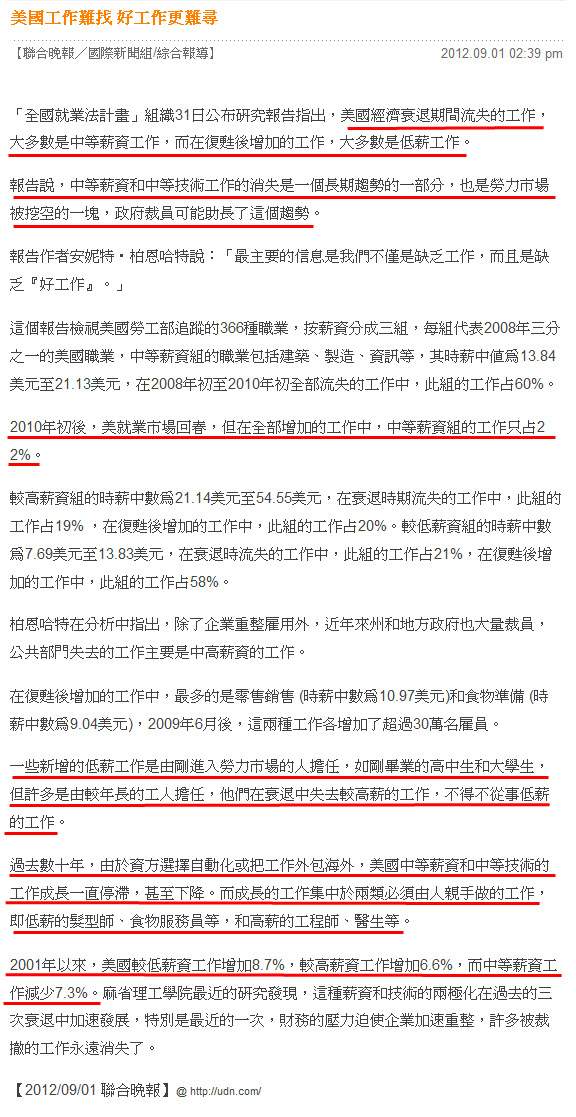美國「租」世代
http://udn.com/NEWS/WORLD/WOR6/7828287.shtml
http://news.chinatimes.com/world/11050401/122012082600356.html
美國「租」世代
- · 2012-08-26 01:18
- · 工商時報
- · 【林國賓】
■美國歷經金融風暴經濟衰退過後,年輕世代的消費觀念與行為出現重大改變,以租代買蔚為風潮,從房子、車子到衣服,很多物品全都是用租的。
■American recession generation opts to rent not buy houses to cars.
2年前安西莫(Michael Anselmo)到紐約市簽下房租租約的同一天,他在巴克顧問公司的飯碗竟然沒了,之後有將近10個月只能用失業救濟金付房租。他現在雖找到了工作,卻依然沒有買房的打算,連腳踏車都不想買。
「失業痛苦經驗讓我對未來很沒有安全感,並影響我所做的每一個決定,」28歲的安西莫說。他現在在聯合醫療集團擔任顧問,在德州奧斯汀租房子住,「未來買房的時點已比我之前規畫的目標還要再延後一大段。」
安西莫正是美國衰退世代的其中一員,此一世代的年輕人在步入成年後正逢經濟深陷衰退,之後景氣是已經復甦,力道卻又是2次戰後最弱的一次。
找不到工作 是大問題
美國衰退世代年輕人所面臨的最大問題就是很難找工作,美國失業率自2009年以來就一直高掛在8%之上,據統計學生貸款的餘額已觸及約1兆美元,導致20到34歲青年人在省錢與保持彈性的考量下,以租為先的消費習慣蔚為風潮,不但租房子住,連汽車與衣服也都是以租代買。
新澤西羅格斯州立大學愛德華布勞斯汀規劃與公共政策學院,公共政策暨政治學教授朱金(Cliff Zukin)表示,就如同經濟大蕭條對1929年時期世代的影響一直持續到2次大戰初期一樣,2008年金融危機對安西莫這一世代的影響也將會非常的長久。
朱金說:「我研究發現,最近這批大學畢業世代害怕承諾,希望不要有束縛,能夠隨時看情況而進行調整,所以,以前像是房子與車子等被認為再穩當不過的投資,在他們的眼裡不但是羈絆,還有很大的風險。」
紐約專研消費者行為的研究顧問業者Envirosell創辦人安德希爾(Paco Underhill)也指出,「2次經濟危機消費者行為確有很大的不同,大蕭條時期根本沒有租用情況轉盛的情形,當今的世代對持有的觀念已改為不是一輩子持有,而是需要時才擁有的即時享樂主義。」
租 享樂主義者新遊戲
看準租用市場的龐大成長商機,許多企業已擴大搶攻相關市場大餅的動作,據市調業者IBIS World預測,美國光是以時計費的汽車出租市場每年商機就高達18億美元,像是Enterprise控股與赫茲(Hertz)全球控股等大企業都在積極擴編旗下租車業務。
股神巴菲特的柏克夏海瑟威控股集團旗下CORT子公司,也是鎖定大學生與剛組成的新家庭進行家具出租的推銷。
羅格斯大學海里奇勞動力發展研究中心今年5月發表一份研究報告指出,最近一次經濟衰退後大學畢業生就業的所得明顯縮水,據調查從2009年到2011年的大學畢業生平均起薪僅27,000美元,較2007年少了3,000美元。
該份報告還提到,許多大學畢業生積欠2萬美元的學貸,有4成的社會新鮮人表示因為學貸負擔沉重,買房與買車等計畫被迫延後。
http://udn.com/NEWS/WORLD/WOR6/7828287.shtml
更多美國高學歷族 當無殼蝸牛
【聯合晚報╱國際新聞組/綜合報導】 2013.04.13 03:18 pm
雖然學歷越高的人薪水越高,但美國很多高學歷者貸款債務也更多,學貸還款負擔沉重,債務與收入比也使他們難以申請購屋貸款,只能租屋居住,即使目前房貸利率和房價都處於歷來最低水準,他們也沒有希望在40歲之前圓了有殼夢。
35歲的德州農工大學歷史系教授尼克特有12萬5000美元(約台幣375萬元)的學貸債務,他的妻子珍妮佛的學貸債務為12萬美元,他們每月要還2500美元的學貸,使他們被拒於按債務與收入比篩檢房貸申請人的銀行。尼克特說,他的高中同學畢業後不讀大學,開始工作、成家,因為沒有學貸債務,在30歲就買了房子,「如果繼續讀書、獲得學位,代表不能實現『美國夢』,是不對的」。
有些人因畢業後在疲弱的勞力市場找工作困難,而耽誤學貸還款,他們的信用紀錄因此被破壞。有公、私立學貸債務者中,有三分之一的人拖延還款90天以上。雖然聲請破產可以勾消房貸和信用卡債務,學貸債務卻不在內,因此銀行可以扣押借款人的退稅、薪水,甚至社安福利支票,來扣還所欠的債。
紐約聯邦準備銀行說,三分之二的有學貸債務者為40歲以下,數以百萬計的他們無法在歷來房價最低時購屋,去年第四季40歲以下者擁有房屋的比率,比第三季下降4.6%,是自1982年來最大的降幅。
Mesirow財務公司首席經濟學家黛安‧史汪克說:「學貸對購屋能力有重大的衝擊,也影響隨購屋而來洗碗機、割草機和其他家庭用品的購買。這對經濟會產生漣漪效應。」她說,在房貸利率和房價破紀錄的低的此時,市場上應該看到更多的第一次購屋者,沒有首購族,換屋者會減少,並使復甦減緩。
這個問題將因1500億美元的私人學貸市場利率上升惡化,一些學貸的利率已超過12%。學貸與房貸不一樣,學貸借款人很難獲得較低利率的重新貸款。一些新的聯邦學貸利率也將在7月加倍成為6.8%,除非國會通過把目前的低利率延長。
美國消費者金融保護局已研擬出一項政策建議,主張使學貸還款經由修正、重新貸款等方式,成為更加負擔得起。這項建議的公共評論期本周已結束,將在定案後提交給國會和教育部。
【2013/04/13 聯合晚報】
http://www.bloomberg.com/news/2012-08-08/recession-generation-opts-to-rent-not-buy-houses-to-cars.html
Recession Generation Opts to Rent Not Buy Houses to Cars
By Caroline Fairchild - Aug 8, 2012 12:00 PM GMT+0800 .Facebook Share LinkedIn Google +1 114 Comments
Print QUEUEQ..
The day Michael Anselmo signed a lease on his first apartment in New York City, he lost his job at Buck Consultants LLC. He spent about 10 months struggling to pay rent with unemployment benefits. Two years later he’s still hesitant to buy a home or even a road bike.
.“Every decision that I have made since I lost my job has been colored by that insecurity I feel about the future,” said Anselmo, 28, who now rents an apartment in Austin, Texas, and works as a consultant for UnitedHealth Group Inc. “Buying a house is just further out on the timeline for me than it used to be.”
Anselmo and many of his peers are wary about making large purchases after entering adulthood in the deepest recession and weakest recovery since World War II. Confronting a jobless rate above 8 percent since 2009 and student-loan debt hitting about $1 trillion, 20-to-34-year-olds are renting apartments, cars and even clothing to save money and stay flexible.
As the Great Depression shaped the attitudes of a generation from 1929 until the early years of World War II, so have the financial crisis and its aftermath affected the outlook of young consumers like Anselmo, said Cliff Zukin, a professor of public policy and political science at the Edward J. Bloustein School of Planning and Public Policy at Rutgers, the state university of New Jersey.
Recession Effects
“This is a generation that is scared of commitment, wants to be light on their feet and needs to adjust to whatever happens,” said Zukin, who’s researched the effects of the recession on recent college graduates. “What once was seen as a solid investment, like a house or a car, is now seen as a ball and chain with a lot of risk to it.”
One key difference is that technology now allows companies to provide younger consumers access to what they want, when they want it and at a reduced cost, said Paco Underhill, founder of New York-based consumer-behavior research and consulting firm Envirosell.
“Renting is something that is in play that wasn’t in play during the Great Depression,” he said. “To a modern generation, ownership isn’t about having it forever, it is about having it when you need to have it,” said Underhill, who has studied shopper behavior.
Hourly Rental
Enterprise Holdings Inc. and Hertz Global Holdings Inc. (HTZ) are expanding in what the Santa Monica, California-based research firm IBISWorld estimates to be the $1.8 billion hourly car- rental business, a segment dominated by younger drivers and made popular by Zipcar Inc. (ZIP) Startups such as Rent the Runway Inc. are supplying high-fashion apparel to satisfy those who want to wear, not own. CORT, a unit of Warren Buffett’s Berkshire Hathaway Inc. (BRK/A), is increasing its furniture-rental marketing efforts to college students and fledgling households, said Mark Koepsell, CORT’s senior vice president.
“Renting makes a lot of sense,” said David Blanchflower, professor of economics at Dartmouth College in New Hampshire and a Bloomberg Television contributing editor. “They have no money and they are not buying fridges and they are not buying the things they normally buy when they set up homes. Their incomes are a lot lower.”
College Graduates
College graduates earned less coming out of the recession, according to a May study by the John J. Heldrich Center for Workforce Development at Rutgers. Those graduating during 2009 to 2011 earned a median salary in their starting job $3,000 less than the $30,000 seen in 2007. The majority of students owed $20,000 to pay off their education, and 40 percent of the 444 college graduates surveyed said their loan debt is causing them to delay major purchases such as a house or a car. The U.S. Consumer Financial Protection Bureau said in March it appeared student loans had reached $1 trillion “several months” earlier.
The U.S. economy shrank 4.7 percent from December 2007 to June 2009, making it the deepest and longest slump in the post- war era. In the three years since the recession ended, the economy has expanded 6.7 percent, the weakest recovery since World War II.
Even as the housing market shows some signs of revival, the slow pace of recovery is keeping the younger generation fearful of investments rather than confident about building wealth for the future, said Jeffrey Lubell, executive director for the Center for Housing Policy, based in Washington. First-time home buyers in 2011 accounted for the smallest percentage of the total since 2006, according to the National Association of Realtors. The vacancy rate of U.S. rental properties is at its lowest level since 2002.
Shifting Attitudes
The shifting attitudes also pose a threat to retail sales, said Candace Corlett, president of New York-based retail- strategy firm WSL Strategic Retail. Younger consumers are already comfortable buying used items and borrowing from friends. Renting will only reinforce their tendency not to buy new.
“In a post-recession economy where retailers are trying to make every shopper count, it’s the wrong direction,” she said. Retail sales fell in June for a third consecutive month, the longest period of declines since 2008.
The by-the-hour segment accounts for about 6 percent of the $30.5 billion U.S. car-rental market, a share that is forecast to rise to about 10 percent in five years, according to IBISWorld.
Enterprise’s Customers
St. Louis-based Enterprise, the largest U.S. car-rental company, expanded in the segment in May by acquiring Mint Cars On-Demand, an hourly car-rental firm with locations in New York and Boston. Half of Enterprise’s customers in this segment are under 35, according to company spokeswoman Laura Bryant.
Hertz, which began renting cars by the hour in 2008, plans to equip its entire 375,000-vehicle U.S. fleet with the technology for hourly rental within about a year, said Richard Broome, senior vice president of corporate affairs and communications for the Park Ridge, New Jersey-based company.
“It made sense to reach the younger demographic to get involved in car sharing,” Broome said. Those 34 and younger make up 84 percent of Hertz’s by-the-hour customer base, he said. “The higher costs of insurance, the higher costs of fuel, the economics would lead someone to conclude that it’s a better decision to rent the car or do car sharing than it is to own a car.”
Zipcar, the Cambridge, Massachusetts-based company that joined the market segment in 2000, says it now has about 731,000 members and more than 11,000 vehicles worldwide. More than half of Zipcar’s customers are under 35, said Mark Norman, the company’s president and chief operating officer.
Formal Wear
“Whether it’s movies by the month, music by the song or formal wear by the occasion, all of those are a smarter way to think about consumption, and Zipcar fits into that really well,” he said. Zipcar’s shares have dropped 43 percent this year under the threat of the new competition.
While sales of new cars are rebounding, 18-to-34-year-olds accounted for 11.8 percent of vehicle registrations for new cars in the five months through May, compared with 16.5 percent in May 2007, according to data from R.L. Polk & Co., an auto- industry research company based in Southfield, Michigan.
Jared Fruchtman, 25, said using Zipcar gives him about $600 more a month to spend on dinners out, cab rides and trips on the weekends.
“It wasn’t financially worthwhile to buy or lease a car right now,” said Fruchtman, who is studying to be a certified public accountant and lives with his girlfriend in a rented apartment in San Francisco.
“I never considered buying,” he said. “It didn’t make sense to tie ourselves down right now.”
High Fashion
That attitude extends to clothes. Rent the Runway, a website that offers high-fashion gowns and other couture for around 10 percent of the purchase price, is also targeting younger consumers. President Jennifer Fleiss, 28, said its business model is “almost recession proof.” Since its start in 2009, the company has grown to about 3 million online members and is adding approximately 100,000 per month. In May 2011, the New York-based company raised $15 million in venture capital from outside investors, said Fleiss. Rent the Runway members typically range from 15 to 35 years old, she said.
Lindsay Abrams, 22, started working in 2009 as an on-campus representative at Vanderbilt University in Nashville, Tennessee, one of 175 colleges with company-sponsored teams to drive brand awareness.
Important Part
“The recession has been an important part of Rent the Runway’s popularity,” said Abrams, who has rented about 15 dresses and is now a customer communications associate for the company. “For people my age, the new thing is renting versus buying. It is a great way to save money.”
Furniture companies are also getting in on the act. Chantilly, Virginia-based CORT, the world’s largest provider of rental furniture, boosted its efforts in 2009 to reach college students and younger customers.
Koepsell, the senior vice president, said the company was “foolish” not to aim for the market earlier. Last year, CORT provided furniture to about 15,000 students and predicts that number will grow to 25,000 this year.
Among CORT’s customers is Michael Ferraiolo, a 20-year-old senior at Virginia Tech, who pays $198 monthly for everything from beds to a coffee table to furnish the rented townhouse he shares with two roommates in Blacksburg, Virginia.
“With the job market such an uncertainty, none of us know where they are going to end up,” Ferraiolo said. “Now, more than ever, you see people moving around in different job markets all throughout their career. We just don’t know what to expect.”
Shifting attitudes about larger purchases aren’t the only reason preventing young consumers from buying. Stricter lending practices and higher requirements for down payments on houses and cars are crowding out buyers, Blanchflower, the Dartmouth economist, said.
Build Wealth
For those who choose to rent not buy, there’s a price to pay, said Lubell of the Center for Housing Policy. By foregoing purchases of assets like homes, young people are giving up on a chance to build wealth, he said.
“What you are seeing is a delay in all the kinds of decisions that require a long-term financially stable future,” Lubell said. “That’s home purchases, that’s marriage and that’s having kids.”
Anselmo, the health consultant who rents an apartment in Austin, Texas, says he understands such arguments. Even so, he can’t bring himself to buy a house.
“The logical person in me gets pissed off when I write a check every month and it just goes down the drain,” he said. “But we are very hesitant.”
To contact the reporter on this story: Caroline Fairchild in Washington at cfairchild2@bloomberg.net
To contact the editor responsible for this story: Christopher Wellisz at cwellisz@bloomberg.net
http://udn.com/NEWS/WORLD/WOR6/7334772.shtml
美國工作難找 好工作更難尋
【聯合晚報╱國際新聞組/綜合報導】
2012.09.01 02:39 pm
【聯合晚報╱國際新聞組/綜合報導】 2012.09.01 02:39 pm
「全國就業法計畫」組織31日公布研究報告指出,美國經濟衰退期間流失的工作,大多數是中等薪資工作,而在復甦後增加的工作,大多數是低薪工作。
報告說,中等薪資和中等技術工作的消失是一個長期趨勢的一部分,也是勞力市場被挖空的一塊,政府裁員可能助長了這個趨勢。
報告作者安妮特‧柏恩哈特說:「最主要的信息是我們不僅是缺乏工作,而且是缺乏『好工作』。」
這個報告檢視美國勞工部追蹤的366種職業,按薪資分成三組,每組代表2008年三分之一的美國職業,中等薪資組的職業包括建築、製造、資訊等,其時薪中值為13.84美元至21.13美元,在2008年初至2010年初全部流失的工作中,此組的工作占60%。
2010年初後,美就業市場回春,但在全部增加的工作中,中等薪資組的工作只占22%。
較高薪資組的時薪中數為21.14美元至54.55美元,在衰退時期流失的工作中,此組的工作占19% ,在復甦後增加的工作中,此組的工作占20%。較低薪資組的時薪中數為7.69美元至13.83美元,在衰退時流失的工作中,此組的工作占21%,在復甦後增加的工作中,此組的工作占58%。
柏恩哈特在分析中指出,除了企業重整雇用外,近年來州和地方政府也大量裁員,公共部門失去的工作主要是中高薪資的工作。
在復甦後增加的工作中,最多的是零售銷售 (時薪中數為10.97美元)和食物準備 (時薪中數為9.04美元),2009年6月後,這兩種工作各增加了超過30萬名雇員。
一些新增的低薪工作是由剛進入勞力市場的人擔任,如剛畢業的高中生和大學生,但許多是由較年長的工人擔任,他們在衰退中失去較高薪的工作,不得不從事低薪的工作。
過去數十年,由於資方選擇自動化或把工作外包海外,美國中等薪資和中等技術的工作成長一直停滯,甚至下降。而成長的工作集中於兩類必須由人親手做的工作,即低薪的髮型師、食物服務員等,和高薪的工程師、醫生等。
2001年以來,美國較低薪資工作增加8.7%,較高薪資工作增加6.6%,而中等薪資工作減少7.3%。麻省理工學院最近的研究發現,這種薪資和技術的兩極化在過去的三次衰退中加速發展,特別是最近的一次,財務的壓力迫使企業加速重整,許多被裁撤的工作永遠消失了。
【2012/09/01 聯合晚報】










 留言列表
留言列表



 {{ article.title }}
{{ article.title }}